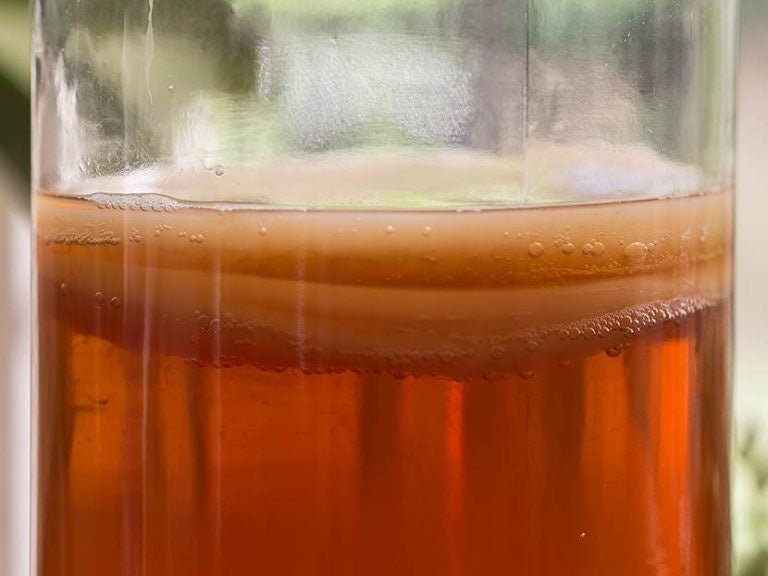There are three main causes for kombucha tasting like vinegar:
- Wrong Sugar
- Heat
- Brewed Too Long
This article will run through these problems and how to deal with them for future brews so that you end up with the delicious homemade kombucha you worked hard for.
Another thing to remember – never throw out your kombucha because it is too vinegary! You will still need to use this for your next brew and if you use the right ratio of starter tea to sweet tea – the kombucha starter tea will not influence the taste of your next batch.

Wrong Sugar
In our experience, the people who want to brew their own homemade kombucha often do so because they care about the quality of the ingredients and are not happy with the large commercial kombucha brands. For this reason – they will often use an organic, unprocessed sugar like rapadura, panela and muscovado on their first attempt.
These sugars have high vitamin and mineral contents (which is normally a good thing) – but for a SCOBY this means the fermentation process takes much more effort. Brown sugar is similar. The molasses that is added back to turn the sugar brown creates problems for the SCOBY. The end result of using unprocessed sugars or sugars with molasses is nearly guaranteed to be strong flavoured and sour – especially if you have brewed the kombucha for the recommended time of around two weeks.
At the opposite end of the spectrum is caster sugar which is probably the most highly refined form of sugar available. Caster sugar seems to end up producing a vinegary tasting kombucha because it is consumed very quickly by the SCOBY. If you leave a brew with caster sugar for the recommended amount of time nearly all of the sugar will have been converted into organic acids – leaving the taste strong and potentially unpleasant.
If you are choosing to use caster sugar – then closely monitor the taste after about a week of brewing to determine when it is ready based on your taste preferences.
Solution:
The easiest way to ensure the sugar doesn’t influence the taste of your brew is to stick closely to these instructions (and also review this article).
Use either plain white sugar for the SCOBY to easily digest – or preferably use an organic cane sugar like this, so you will not have to worry about any heavy metal or chemical contamination like what can be found in normal white sugar. Organic cane sugar is not as rich in things that make unprocessed sugars difficult for the SCOBY to digest (producing the sour taste) – but without the nasty stuff making it the best of both worlds.

Heat
The bacteria and yeast strains that convert sweet tea into kombucha operate best at a temperature range of 20-25°C. If temperatures are too cold – the microbes in the culture will become dormant and little to no fermentation will happen. If temperatures are too hot – the fermentation process will go into overdrive, making the kombucha mature faster and end up with a sour, vinegar-like taste.
In the kombucha world – a fast brew is normally not a good brew.
Keep your kombucha out of the anywhere exposed to sunlight and make sure the temperature range stays as constant as possible.
Solution:
Use brewing thermometers like these and keep a record of the temperature a couple of times a day. Once you have a few days worth of data you will have a good understanding of the temperatures in your chosen brewing location.
If the average temperatures are too hot – move your brew to a cooler part of the house. Once you get the temperatures right your brew will ferment at the right pace – resulting in a better taste. If your house is hot, then perhaps start tasting your brew sooner and expect it to finish brewing after about 10 days.
Brewed Too Long
At the Homemade Kombucha Co. we like our kombucha brewed usually between 13-16 days depending on the temperature. In our opinion this produces a bold flavour with a slight sweetness and by brewing for this much time most of the sugar has been used up by the SCOBY.
Brewing a decent tasting kombucha is a pretty straightforward process if you are following our instructions and have an understanding of the important factors in the brewing process. Brewing a great kombucha requires a bit more finesse, and as this article has explained if your kombucha tastes like vinegar then there are a couple of variables that are likely to be causing the issue.
By being conscious of the type of sugar and the temperature you are doing a lot to minimise having a vinegary kombucha. The final thing you can easily control is the time before you harvest your brew for drinking. This isn’t an exact science so treat our advice as a guideline – and remember that the ideal brew time is closely related to the temperature.
Solution:
Get your sugar choice right and make sure your brew space is in the ideal temperature range. Once those variables are under control, keep a close eye on your brew from about 7 days. Start tasting regularly until you find your sweet spot – this is likely to be somewhere between 8 and 16 days depending on how strong your sweet tooth is!

